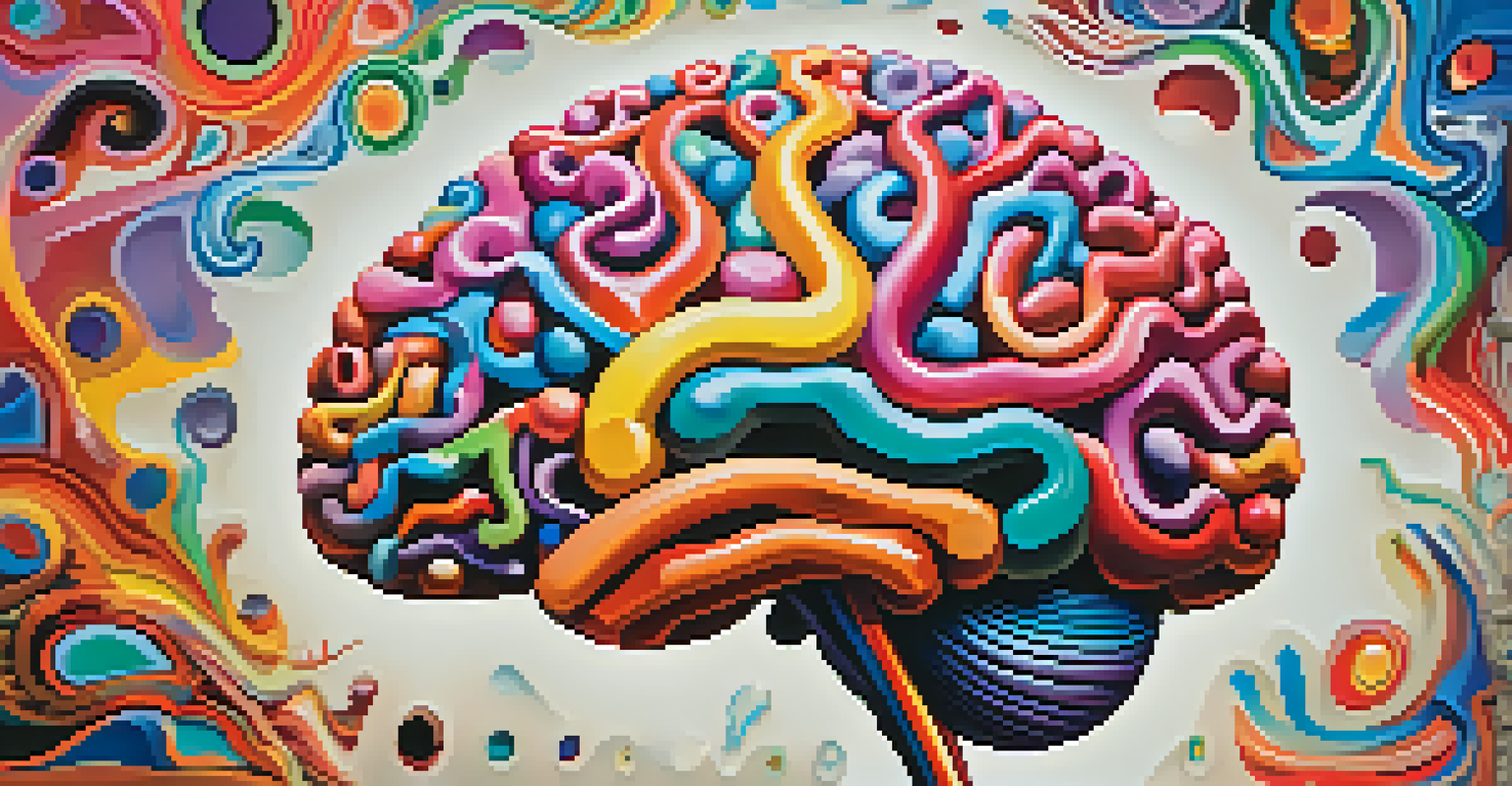Exploring Hallucinogens: Impact on Cognitive Aging Processes

Understanding Hallucinogens and Their Effects
Hallucinogens are substances that alter perception, mood, and cognitive processes. Common examples include LSD, psilocybin (magic mushrooms), and mescaline. These substances can produce profound changes in sensory experiences and thought patterns, often leading to enhanced creativity or introspection.
The mind is everything. What you think you become.
While historically viewed with skepticism, recent research has begun to shed light on the potential therapeutic benefits of hallucinogens, particularly in mental health. They are now being studied for their possible roles in treating conditions like depression and anxiety. Understanding their effects is crucial as we explore their impact on cognitive aging.
The way hallucinogens interact with the brain's chemistry can offer insights into how they might influence cognitive processes, especially as we age. This connection poses intriguing questions about their potential to enhance or impair cognitive function in older adults.
Cognitive Aging: What Is It?
Cognitive aging refers to the gradual decline in cognitive abilities as people age. This might include slower processing speeds, memory challenges, or difficulties in multitasking. While it’s a natural part of life, the extent and impact can vary widely from person to person.

Factors such as genetics, lifestyle, and overall health play significant roles in cognitive aging. For instance, a balanced diet, regular exercise, and mental stimulation can help maintain cognitive health. Conversely, conditions like dementia can significantly accelerate cognitive decline, leading to serious challenges.
Hallucinogens and Mental Health
Research indicates that hallucinogens may alleviate symptoms of anxiety and depression in older adults.
Understanding cognitive aging is essential when considering the effects of hallucinogens. By exploring how these substances might interact with the aging brain, we can uncover potential benefits or drawbacks that might help improve quality of life for older adults.
Research on Hallucinogens and Aging
Recent studies have begun to investigate the effects of hallucinogens on cognitive functioning, particularly in older populations. For instance, research has suggested that substances like psilocybin may promote neuroplasticity, the brain's ability to adapt and reorganize itself. This could potentially counteract some effects of cognitive aging.
The greatest discovery of my generation is that a human being can alter his life by altering his attitude.
Some findings indicate that hallucinogens can lead to increased creativity and divergent thinking, skills that might decline with age. These enhancements could provide older adults with new ways to engage with their environment and maintain cognitive vitality. However, more research is needed to fully understand these implications.
As this area of study grows, it’s essential to approach it with both excitement and caution. While the potential benefits are intriguing, researchers must also consider the safety and long-term effects of hallucinogen use in older adults.
Potential Benefits of Hallucinogens for Older Adults
One of the most promising aspects of hallucinogen research is their potential therapeutic benefits for older adults. For example, some studies suggest that these substances may alleviate symptoms of anxiety and depression, which can be prevalent in aging populations. By improving mental health, hallucinogens might indirectly support cognitive functions.
Additionally, hallucinogens may encourage social connection and emotional well-being, essential factors in enhancing cognitive health as we age. Engaging in shared experiences during trips can foster deeper relationships and reduce feelings of isolation, which is crucial for cognitive longevity.
Cognitive Aging Impacts
Cognitive aging involves a natural decline in abilities like memory and processing speed, influenced by various lifestyle factors.
As we explore these potential benefits, it’s important to conduct rigorous research to determine safe and effective ways to integrate hallucinogens into therapeutic settings for older adults. The goal would be to maximize positive outcomes while minimizing risks.
Risks and Considerations of Hallucinogen Use
While there are potential benefits, it's equally important to acknowledge the risks associated with hallucinogen use, particularly in older adults. These substances can cause anxiety, confusion, or even exacerbate pre-existing mental health issues. Therefore, a careful screening of individuals considering hallucinogen therapy is crucial.
Moreover, the unpredictable nature of hallucinogenic experiences can be daunting for those who may already be dealing with cognitive decline. Ensuring a supportive environment during these experiences can help mitigate adverse effects and enhance the overall experience.
Ultimately, it’s vital to weigh the risks against the potential benefits. This requires a comprehensive understanding of an individual's health history and a clear discussion about expectations and outcomes.
Future Directions in Hallucinogen Research
As interest in hallucinogens grows, researchers are looking at various avenues for future exploration. Longitudinal studies could provide deeper insights into the long-term effects of hallucinogen use on cognitive aging. This type of research would help clarify how these substances influence cognitive functions over time.
Additionally, exploring different types of hallucinogens and their specific impacts on cognition could lead to tailored therapies for older adults. This means not all hallucinogens are created equal; understanding their unique effects could help optimize their use in therapeutic settings.
Risks of Hallucinogen Use
While hallucinogens show promise, they also carry risks such as anxiety and confusion, particularly in aging populations.
Future research will also need to address the ethical considerations surrounding hallucinogen use, especially in vulnerable populations. Establishing guidelines and best practices will be key to ensuring that this promising avenue of research is approached responsibly.
Conclusion: Navigating the Complex Landscape
Exploring the impact of hallucinogens on cognitive aging presents a fascinating yet complex landscape. While the potential benefits are promising, the associated risks and ethical considerations cannot be overlooked. It’s a delicate balance that must be navigated with care.
As our understanding of both cognitive aging and hallucinogens evolves, so too will the discussions surrounding their use. Engaging with this topic requires an open mind and a commitment to scientific inquiry, ensuring that we are making informed decisions.

In the end, whether hallucinogens can serve as a tool for enhancing cognitive health in older adults remains to be seen. But the journey of exploration is vital, paving the way for new insights and potential breakthroughs in the realm of cognitive aging.